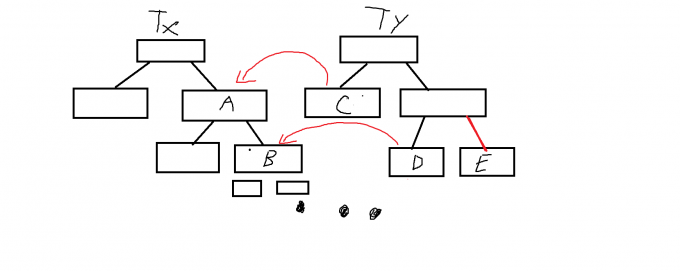1
2
3
4
5
6
7
8
9
10
11
12
13
14
15
16
17
18
19
20
21
22
23
24
25
26
27
28
29
30
31
32
33
34
35
36
37
38
39
40
41
42
43
44
45
46
47
48
49
50
51
52
53
54
55
56
57
58
59
60
61
62
63
64
65
66
67
68
69
70
71
72
73
74
75
76
77
78
79
80
81
82
83
84
85
86
87
88
89
90
91
92
93
94
95
96
97
98
99
100
101
102
103
104
105
106
107
108
109
110
111
112
113
114
115
116
117
118
119
120
121
122
123
124
125
126
127
128
129
130
131
132
133
134
135
136
137
138
139
140
141
142
143
144
145
146
147
148
149
150
151
152
153
154
155
156
157
158
159
160
161
162
163
164
165
166
167
168
169
170
171
172
173
174
175
176
| #include <cstdio>
#include <cstring>
#include <cstdlib>
#include <algorithm>
#include <cctype>
#include <iostream>
#include <queue>
#include <vector>
#include <set>
#define ll long long
#define ull unsigned long long
#define ri register int
#define pb push_back;
#define SIZE 1926081
inline char gc(){
static char buf[SIZE],*p1=buf,*p2=buf;
return p1==p2&&(p2=(p1=buf)+fread(buf,1,SIZE,stdin),p1==p2)?EOF:*p1++;
}
template <class T>inline void read(T &x){
x=0;int ne=0;char c;
while((c=getchar())>'9'||c<'0')ne=c=='-';x=c-48;
while((c=getchar())>='0'&&c<='9')x=(x<<3)+(x<<1)+c-48;x=ne?-x:x;return ;
}
using std::min;
using std::set;
using std::lower_bound;
const int maxn=200005;
const int N=2000005;
const int inf=0x7fffffff;
int n,m;
int sum[N<<2],ls[N<<2],rs[N<<2];
int st[N<<2],top=0;
inline void del(int x){st[++top]=x;}
inline int get_node(){int x=st[top];top--;sum[x]=ls[x]=rs[x]=0;return x;}
struct Seg{
int l,r,rt,ty;
Seg(){l=r=rt=ty=0;}
Seg(int _l,int _r,int _rt,int _ty){l=_l,r=_r,rt=_rt,ty=_ty;}
bool operator <(const Seg &b)const{
return r==b.r?l<b.l:r<b.r;
}
};
set<Seg>se;
int pos;
inline void pushup(int now){
sum[now]=sum[ls[now]]+sum[rs[now]];return ;
}
int merge(int x,int y){
if(!x)return y;
if(!y)return x;
int t=get_node();
sum[t]=sum[x]+sum[y];
ls[t]=merge(ls[x],ls[y]);
rs[t]=merge(rs[x],rs[y]);
del(x),del(y);
return t;
}
void split(int &now,int &po,int l,int r,int k){
if(!now)return ;
if(!po)po=get_node();
if(l==r){
sum[now]-=k,sum[po]+=k;
return ;
}
int tt=sum[ls[now]],mid=(l+r)>>1;
if(k<tt)split(ls[now],ls[po],l,mid,k);
else ls[po]=ls[now],ls[now]=0;
if(tt<k){
split(rs[now],rs[po],mid+1,r,k-tt);
}
pushup(now),pushup(po);
return ;
}
void update(int &now,int l,int r){
if(!now)now=get_node();
sum[now]++;
if(l==r)return ;
int mid=(l+r)>>1;
if(pos<=mid)update(ls[now],l,mid);
else update(rs[now],mid+1,r);
return ;
}
int query(int now,int l,int r){
if(l==r){
return l;
}
int mid=(l+r)>>1,tt=sum[ls[now]];
if(tt>=pos)return query(ls[now],l,mid);
pos-=tt;
return query(rs[now],mid+1,r);
}
Seg tmp=Seg(0,0,0,0);
set<Seg>::iterator it,pit;
inline int solve(int op,int l,int r){
int x;
tmp=Seg(0,l,0,0);
it=se.lower_bound(tmp);
tmp=*it;x=0;
if(tmp.l!=l){
se.erase(it);
if(tmp.ty==0){
pos=l-tmp.l;
split(tmp.rt,x,1,n,pos);
se.insert(Seg(tmp.l,l-1,x,0));
se.insert(Seg(l,tmp.r,tmp.rt,0));
}
else{
pos=tmp.r-l+1;
split(tmp.rt,x,1,n,pos);
se.insert(Seg(tmp.l,l-1,tmp.rt,1));
se.insert(Seg(l,tmp.r,x,1));
}
}
tmp=Seg(0,r,0,0);
it=se.lower_bound(tmp);
tmp=*it,x=0;
if(tmp.r!=r){
se.erase(it);
if(tmp.ty==0){
pos=r-tmp.l+1;
split(tmp.rt,x,1,n,pos);
se.insert(Seg(tmp.l,r,x,0));
se.insert(Seg(r+1,tmp.r,tmp.rt,0));
}
else{
pos=tmp.r-r;
split(tmp.rt,x,1,n,pos);
se.insert(Seg(tmp.l,r,tmp.rt,1));
se.insert(Seg(r+1,tmp.r,x,1));
}
}
x=0,it=se.lower_bound(Seg(0,l,0,0));
while(it!=se.end()&&(*it).r<=r){
tmp=*it;
x=merge(x,tmp.rt);
se.erase(it);
it=se.lower_bound(Seg(0,l,0,0));
}
se.insert(Seg(l,r,x,op));
return x;
}
int main(){
int x,y;
int op,l,r;
for(ri i=N;i>=0;i--)st[++top]=i;
read(n),read(m);
for(ri i=1;i<=n;i++){
read(x);
y=get_node();
pos=x;
update(y,1,n);
se.insert(Seg(i,i,y,0));
}
while(m--){
read(op),read(l),read(r);
solve(op,l,r);
}
read(x);
y=solve(0,x,x);
pos=1;
printf("%d\n",query(y,1,n));
return 0;
}
|
